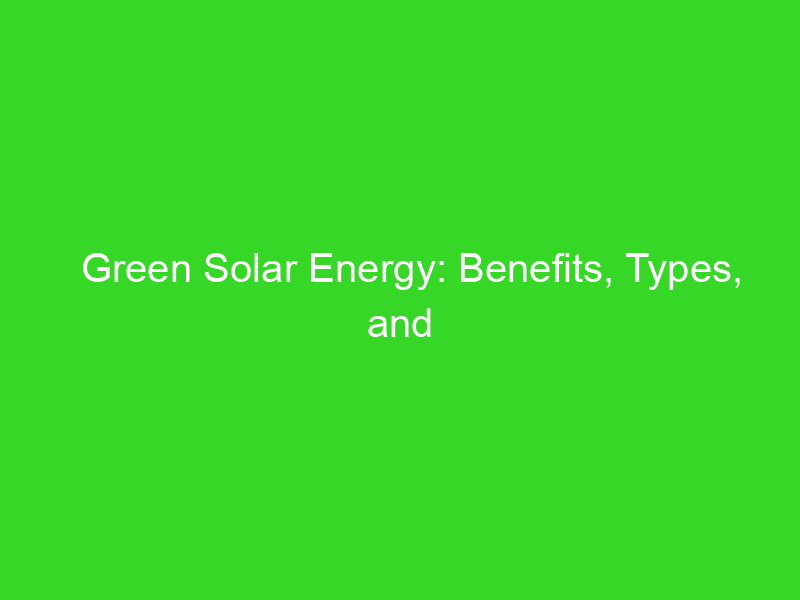
Green Solar Energy
Solar energy is one of the most promising sources of renewable energy. It has been gaining popularity over the past few years due to its environmental benefits, cost-effectiveness, and potential to become a major source of energy worldwide. Green solar energy is a clean, sustainable, and eco-friendly source of energy that can be used for both residential and commercial purposes.
What is Green Solar Energy?
Green solar energy refers to the use of solar power for generating electricity while minimizing the negative impact on the environment. It is a sustainable and renewable source of energy that does not emit harmful pollutants or greenhouse gases. Green solar energy systems use photovoltaic (PV) panels to convert sunlight into electricity, which can be used to power homes, businesses, and other facilities.
Benefits of Green Solar Energy
There are several benefits of green solar energy, including:
1. Environmentally Friendly
Green solar energy is a clean and renewable source of energy that does not generate any harmful pollutants or greenhouse gases. It helps to reduce our carbon footprint and mitigate the negative impact on the environment.
2. Cost-Effective
Green solar energy can help to reduce energy costs over time. Although the initial investment may be high, the long-term benefits of using solar energy can outweigh the costs. Once the solar panels are installed, the energy generated is free, and the maintenance costs are minimal.
3. Energy Independence
Green solar energy can help to reduce our dependence on fossil fuels and foreign oil. It provides a reliable and sustainable source of energy that can be used to power homes and businesses.
4. Increases Property Value
Installing solar panels can increase the value of a property. Homebuyers are increasingly looking for energy-efficient homes that have solar panels installed. This can help to increase the resale value of a property.
5. Government Incentives
Many governments offer incentives for installing green solar energy systems. These incentives can include tax credits, rebates, and other financial benefits.
Types of Green Solar Energy Systems
There are two main types of green solar energy systems:
1. Grid-Tied Solar Systems
Grid-tied solar systems are connected to the electrical grid and provide electricity to a home or business. Any excess electricity generated by the system is fed back into the grid and credited to the owner's account. This type of system is ideal for those who want to reduce their energy costs and generate their electricity.
2. Off-Grid Solar Systems
Off-grid solar systems are not connected to the electrical grid and provide electricity directly to a home or business. These systems are ideal for areas that are not connected to the grid or require a reliable source of energy. They typically require batteries to store excess energy generated during the day for use at night.
Installing Green Solar Energy Systems
Installing green solar energy systems requires careful planning and installation. It is important to choose a reputable installer that has experience in installing solar panels. The installer will assess the property to determine the best location for the panels and determine the optimal angle and direction for maximum energy generation.
Conclusion
Green solar energy is a clean, sustainable, and renewable source of energy that can be used to power homes and businesses. It provides several benefits, including cost-effectiveness, energy independence, and environmental sustainability. With the increasing popularity of solar energy and the availability of government incentives, it is becoming easier and more affordable to install green solar energy systems.





